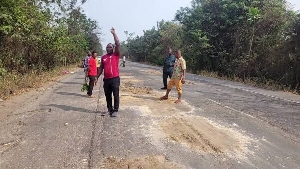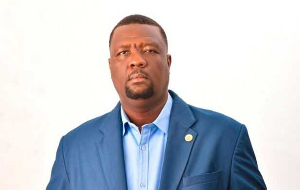Members of the Church of Pentecost, Ghana have joined forces with their lead pastor to repair potholes along the Accra-Kumasi highways on Sunday, February 18, 2024.
The initiative comes in response to the alarming number of fatalities and injuries caused by accidents along the Nkawanda sections of the highway in the Kwahu West Municipality.
Despite repeated pleas from commuters and residents, authorities have failed to address the hazardous conditions of the road, which has routinely led to tragic consequences.
Numerous reports from users of the Accra-Kumasi road have highlighted the perilous state of the Nkawanda segments.
Nkawkaw-based Agoo FM has consistently raised concerns about the deteriorating road conditions, urging government intervention to prioritize repairs as an urgent matter.
Driven by a sense of duty to their community and a desire to prevent further tragedies, the church members and their pastor took matters into their own hands, taking up shovels and filling materials to mend the treacherous potholes.
Their actions underscore the urgent need for authorities to address the infrastructure deficiencies that endanger lives daily.
On Sunday, February 18, 2024, the New Jejeti District Pastor for the Church of Pentecost, along with dedicated male and female congregants, embarked on their mission to repair the stretch that has transformed into a deathtrap.
Addressing concerns to Agoo FM News, Pastor Stephen Obeng Asare lamented the perilous state of the road, emphasizing the alarming rate at which it claims innocent lives.
In an earnest plea directed towards the government, Pastor Asare urged swift action to ensure the road’s permanent repair, highlighting that their efforts were only a temporary solution to a longstanding problem.
The scene was one of collective determination, with both men and women shouldering the burden of labor. Some carried pans on their heads, while others utilized wheelbarrows to transport sand from nearby bushes, all in a concerted effort to fill the potholes.
General News of Monday, 19 February 2024
Source: kasapafmonline.com
Nkawkaw: Church of Pentecost takes action to fix deadly highway potholes
Entertainment












